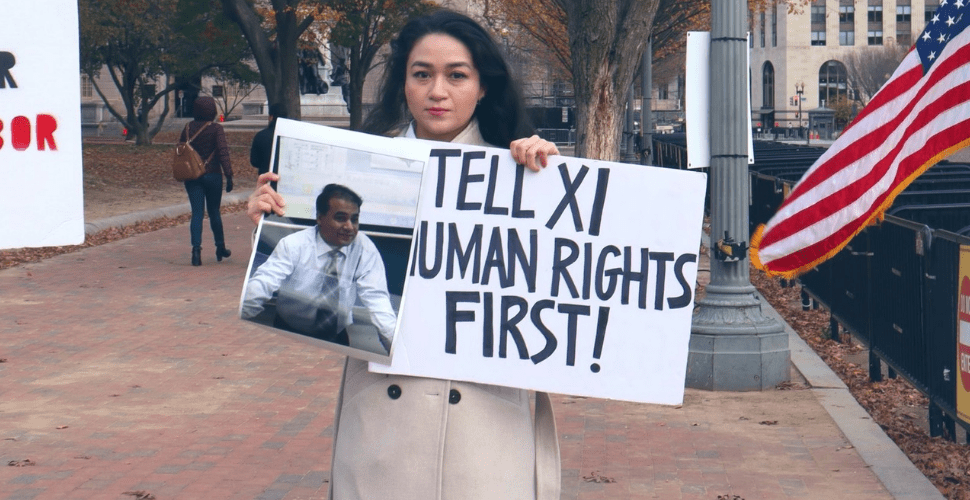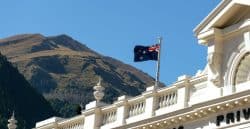Jewher Ilham is a human rights advocate, author, and the daughter of Uyghur scholar Ilham Tohti, the renowned activist and human rights defender whom the Chinese regime sentenced in September 2014 to life imprisonment for “incitement to separatism.” His whereabouts are currently unknown.
The recent implementation of the Uyghur Forced Labor Prevention Act (UFLPA) in the U.S. marked an important milestone in the fight to end forced labor in the Uyghur Region.
In an opinion piece for Thomson Reuters Foundation, Jewher explains how we must do more to stop abuses against Uyghurs.
Uyghur Forced Labor Prevention Act is just the beginning
After years of hundreds of activists like Jewher and Ilham Tohti raising awareness of Uyghur forced labor, the United States, the world’s largest importer of goods, has finally made a trade policy determination: no goods produced in the Xinjiang region can enter the country because they are presumed to have been produced through the slave labor of Uyghurs and Muslim minority groups.
The UFLPA is one of the few laws enacted by Congress in decades that holds brands and retailers accountable for what happens to the overseas workers who create their products: the law will force these companies to stop sourcing from suppliers complicit in the use of forced labor. Jewhere adds, however:
“As a Uyghur, I am heartened by this crucial step towards protecting my community and other Turkic and Muslim peoples persecuted in China. The legislation sets a precedent that could change the course of history, but this is just the start.”
In her opinion column she also outlines the major impacts this law will have on different industries wanting to do business in the U.S., as well as new gimmicks corporations could come up with to evade the law.
Since the Department of Homeland Security and other relevant U.S. government agencies promised full and vigorous enforcement of the UFLPA, corporations will be looking for new shortcuts.
The role of the European Commission
Jewher, as part of the independent labor rights monitoring organization Worker Rights Consortium, points out what many other organizations fear regarding brands that also trade in other countries, where there is no law similar to the UFLPA.
“There is a risk some corporations may divert forced labor-tainted goods to markets where comprehensive legislation restricting imports is not in place – like Australia, Japan, and the EU.”
Jewher identifies another risk, which is that companies split their supply chain to comply with U.S. legislation, while still benefiting from forced labor by selling products from the Uyghur region in these other markets. For example, if a brand’s goods are seized at port by U.S. regulators because those goods violate the UFLPA, the brand has the right to re-export the goods and attempt to sell them in another country.
While the European Commission has pledged to introduce some sort of ban on the importation of products made with forced labor, there is still no concrete regulation. Freedom United as part of the Coalition to End Forced Labor in the Uyghur Region is therefore calling on all international brands to apply a single global standard – in line with the UFLPA – in all their retail markets. Jewher states clearly in her column:
“We need every world leader to refuse to allow companies operating within their borders to benefit from Uyghur forced labor, and we need every corporation to wake up to the consequences of these actions and clean up their supply chains.“
Urban Outfitters must do better
Following activist pressure, Urban Outfitters updated its Forced Labor Statement on June 20, 2022, one day before the new law came into effect, in which it states:
“Though we continuously communicate and reiterate our policies to our vendors, we recognize that a significant amount of the world’s cotton is sourced from XUAR. We will continue to take steps to improve our due diligence within our supply chain to ensure we are not contributing to forced labor schemes. For example, we are implementing a Cotton Risk Screen program, as well as engaging in Supply Chain Mapping, to ensure we have visibility to upstream tiers of our supply chain and can prioritize due diligence in the most effective way.”
The steps must be transparent, and we continue to demand that they publish the list of suppliers and intermediaries with whom they do business. The UFLPA is a first step, but we must continue to push to end Uyghur forced labor. Tell fashion brands to end #ForcedLabourFashion everywhere here.







Freedom United is interested in hearing from our community and welcomes relevant, informed comments, advice, and insights that advance the conversation around our campaigns and advocacy. We value inclusivity and respect within our community. To be approved, your comments should be civil.
Xi has made China a pariah,nothing should be bought from the CCP.